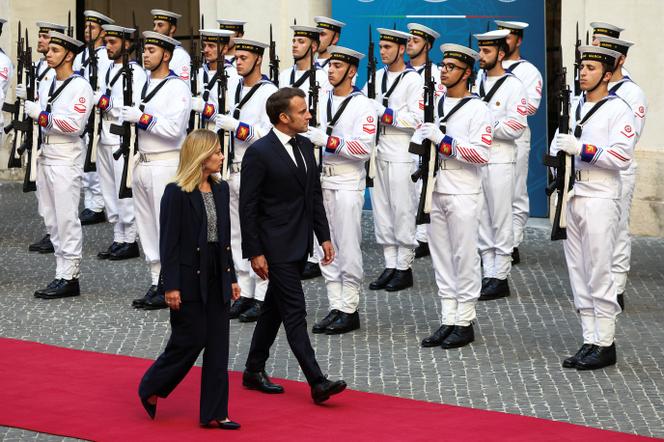


Italy's Giorgia Meloni and France's Emmanuel Macron met on Tuesday, June 3, in Rome, reconciling their differences to put forward a "common commitment" as they confront shared challenges, notably US tariffs and the Ukraine war.
The far-right prime minister welcomed the centrist French president to her Palazzo Chigi office, where they held three hours of talks followed by dinner. They are not natural political allies, but as the leaders of the EU's second- and third-largest economies, they are both grappling with the fall-out from the war in Ukraine, as well as US President Donald Trump's sweeping tariffs against the bloc.
"Italy and France, dedicated to their role as founding states of the European structure, aim to strengthen their common commitment for a more sovereign, stronger and more prosperous Europe, above all for peace," the countries said in a joint statement following the talks. "The meeting highlighted strong convergences on the European competitiveness agenda," it added, announcing a bilateral summit in France in early 2026.
Ahead of the meeting, Meloni on Friday acknowledged "divergences" with Macron but denied she had any "personal problems" with him, and said she was "very happy" with the visit. Macron's office, meanwhile, had said that Italy was "an important partner" with "a crucial role to play in European decisions," particularly in the Ukrainian conflict.
The two leaders were showing they were "capable of moving forwards together on the essentials," the French presidency said.
Their cooperation has been sorely tested by Trump, with the pair disagreeing over how to deal with the US president on both tariffs and Ukraine. Meloni and Macron have an "undeniable rivalry," said Marc Lazar, a professor at Sciences Po university in Paris. He said the pair were following different strategies with Meloni seeking "mediation and compromise" with the US president and Macron favoring "unwavering firmness." But while Paris says it has "respect" for those who can "maintain the best possible relationship with President Trump," it insists that trade negotiations are the responsibility of the European Commission − effectively sidelining Meloni as a would-be mediator.
On Ukraine, Macron presents himself as the EU's go-to man on the issue, speaking to Trump regularly and invoking the relationship developed during the billionaire's first term. And he has seriously ruffled feathers in Rome with his attempts to put together a "coalition of the willing" ready to provide "security guarantees" to Ukraine.
In recent weeks, the French president's meetings on the Russian invasion with the British, German and Polish leaders − but without Meloni − have ratcheted up tensions. Paris says that "between Europeans, the issue of formats must be arranged to achieve the best impact we can under the circumstances." It says that Italy has always insisted the US take part. But the two countries on Tuesday in their joint statement reaffirmed that the "continued unwavering support of France and Italy for Ukraine is even more necessary to achieve a just and lasting solution."
